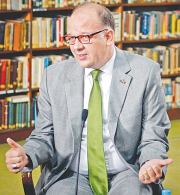Everyone has strategic interests in Syria … Syria was enjoying a lifestyle like nowhere else in the Arab world. We were almost free …
 Syria was once the underlying bedrock of Arab nationalism; it used to be a source of pride for Arab secularists. At least in Arab eyes, it was a bastion of resistance against Israeli tyranny and American imperialism. But these days the country that exerted such significant political and military clout in the bloody Lebanese civil war (1975-1990) is mortally wounded by its own apocalyptic war, nothing short of a Jihād. On 27 November 2015, the Syrian ambassador in Pakistan, HE Radwan Loutfi gave a talk entitled The Future of Syria in the historic library of The Pakistan Institute of International Affairs (PIIA). The astute diplomat was unforgiving in his denouncement of foreign interests plaguing the survival of his country. But eager to build unity among his fellow Syrians, he explained: “I am Sunni, but I will be the first to protect the shrine of Sayeda Zainab.” Urging world leaders against further warmongering, he called for an immediate ceasefire followed by a strong willed political process “that would leave only Syrians to discuss” and decide the future of their annihilated homeland.
Syria was once the underlying bedrock of Arab nationalism; it used to be a source of pride for Arab secularists. At least in Arab eyes, it was a bastion of resistance against Israeli tyranny and American imperialism. But these days the country that exerted such significant political and military clout in the bloody Lebanese civil war (1975-1990) is mortally wounded by its own apocalyptic war, nothing short of a Jihād. On 27 November 2015, the Syrian ambassador in Pakistan, HE Radwan Loutfi gave a talk entitled The Future of Syria in the historic library of The Pakistan Institute of International Affairs (PIIA). The astute diplomat was unforgiving in his denouncement of foreign interests plaguing the survival of his country. But eager to build unity among his fellow Syrians, he explained: “I am Sunni, but I will be the first to protect the shrine of Sayeda Zainab.” Urging world leaders against further warmongering, he called for an immediate ceasefire followed by a strong willed political process “that would leave only Syrians to discuss” and decide the future of their annihilated homeland.
Yet the diplomat explained that a ceasefire in Syria remained “impossible” until the terrorists were rooted out. He also accused Turkey of having trade links with ISIS. His talk comes against the backdrop of the terrorist attacks in Paris, killing 130 and wounding hundreds of others, and the downing of the Russian Metrojet airliner in Egypt causing 224 fatalities. Insofar as military action is concerned, these days an “ISIS first” mentality prevails because its extremists in Raqqa are the “head of the snake” and must, of course, be “crushed”. Despite the rhetoric constantly pouring out of London, Paris and Washington Continue reading




 I am writing about the
I am writing about the 







